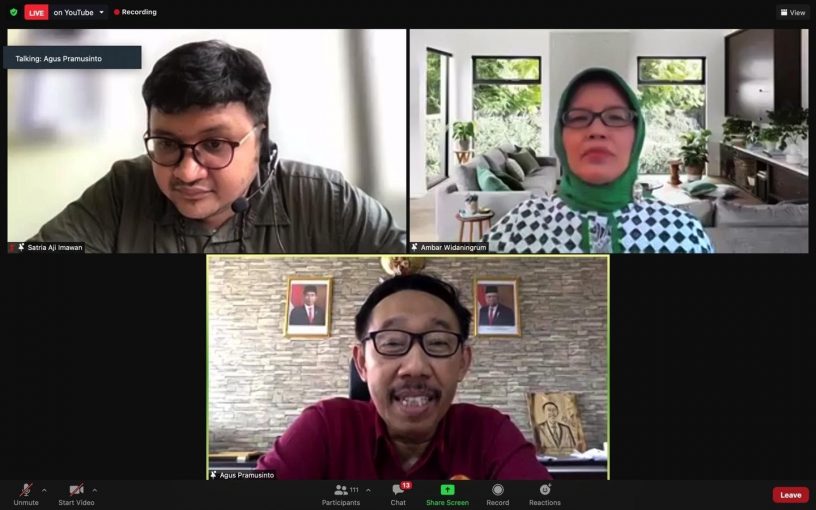
Yogyakarta, October 6th 2021─The Department of Public Management and Policy (DMKP) Fisipol UGM held a MKP Book Corner #1 titled “Governance and Staffing Reformation In Indonesia’s Public Sector” on Wednesday (6/10). The book reviewed was from the State of the Art series titled Overview of Management Studies and Public Policy in Indonesia. The event was held virtually through Zoom Meeting with speakers from DMKP Fisipol UGM such as Prof. Dr. Agus Pramusinto, MDA. and Dr. Ambar Widaningrum, as well as Dr. Falih Suaedi, M. Si. as a lecturer from Public Administration FISIP Airlangga University.
To start the discussion, Ambar Widaningrum said that public value needs to be included in the State of the Art book because our society is getting more varied in every aspect and they’re facing problems that are more complex as the day goes on. “We also know that the public issue right now is no longer organized and is accompanied by changes that are hard to predict. That is why we often call it the VUCA era (Volatility, Uncertainly, Complexity & Ambiguity) which pushes the government to be more agile,” she said. Other than that, the citizens are seen as capable to problem solve deliberatively which allows them to be included in the process of creating a public spirit, so that public values can appear from the active and inclusive contribution and dialogue in the community.
Agus Pramusinto talked more about the civil service reform in Indonesia where human resources in the public sphere is seen as important to deliver development policies. We can see the practices of successful countries such as Korea with a per capita income far above Indonesia’s that is accompanied by a strong human resource. “We hope that the human resources in the public sphere can have spirit, agility, and adaptiveness in serving the public,” he said. Then, he said that one of the reasons behind the failure of public value is because of a broken articulation and value aggregation mechanism. A weak authority system in developing countries usually doesn’t have the power to implement public value, which in the case of Indonesia is related to corruption. Although there is a Corruption Eradication Commission (KPK in Bahasa Indonesia), there are virtually no special strategies that are being constructed, planned, or implemented to eradicate corruption.
Falih Suaedi said that public value should be more dynamic while still being accompanied by accountability, transparency, and public participation. “The civil society itself is already good. Now in the millennial and digitalization era everything should be more accountable, transparent, and the participation should be wide open. But the fact is in developing countries, the corruption eradication commission is not active because there is no political goodwill from the ruler,” he said.
